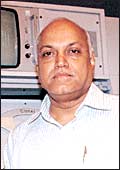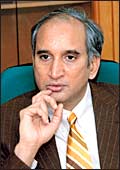|
It's
like an elaborate game of snakes and ladders. There's a starting
point, lots of ladders, a few snakes and lots of space for sideways
movements. There's also a designated "Home" or final
destination; but the game still carries on indefinitely, giving
every laggard a chance of catching up with the leaders.
The BSE Sensex has climbed from 3,000 (3,130.46
to be exact; the starting point of our game) on May 28, 2003 to
7,076.52 on June 21, 2005 (the first day the market closed over
7,000). A random sampling shows that during these 25 months, the
promoters of India's 50 most valuable companies by market capitalisation
increased their collective net worth by a factor of at least three.
We say at least because only their holdings in their leading listed
companies have been considered. But India Inc. also has fabulous
wealth locked up in privately held companies and trusts. This,
obviously, could not be valued as it is out of the public domain.
That's just the bigger picture. The fine
print makes for even more interesting reading. Azim Premji has
been rolling out sixes at will and every throw of the dice takes
him to yet another ladder. It's no surprise that he's the richest
man in the land; his 83 per cent holding in Wipro is valued at
Rs 43,872 crore. That's an increase of 167 per cent over his net
worth of Rs 16,417 crore 25 months ago (see tables). In the process,
he's just pipped the Ambani family, whose stake in Reliance Industries
has risen 124 per cent in value from Rs 18,734 crore to Rs 42,006
crore during this period, to the post. Interestingly, the Ambanis
had maintained a slender lead over Premji when the Sensex touched
3,000, 4,000, 5,000 and 6,000, respectively, and lost out only
in its final surge past the 7,000-mark.
|
Rank
|
Promoting Family (Head) |
Company
|
Value of stake on June 21, 2005 (Rs crore) |
| 1 |
Premji (Azim
Premji) |
Wipro |
43,872.48 |
| 2 |
Ambani (Mukesh
& Anil)* |
Reliance Industries |
43,087.34 |
| 3 |
Mittal (Sunil
Mittal) |
Bharti Tele-Ventures |
20,526.65 |
| 4 |
Nadar (Shiv
Nadar) |
HCL Technologies |
8,676.64 |
|
|
HCL Infosystems |
1,747.79 |
|
|
|
10,424.43 (TOTAL) |
| 5 |
Sanghvi (Dilip
Sanghvi) |
Sun Pharma |
7,435.36 |
| 6 |
Singh (Malvinder
Singh) |
Ranbaxy |
7,209.87 |
| 7 |
Birla (K.M.
Birla) |
Hindalco |
2,998.36 |
|
|
Grasim |
2,474.77 |
|
|
Indian Rayon |
774.77 |
|
|
Indo Gulf
Fertilisers |
330.53 |
|
|
|
6,578.43 (TOTAL) |
| 8 |
Bajaj (Rahul
Bajaj) |
Bajaj Auto |
4,284.70 |
| 9 |
Hamied (Y.K.
Hamied) |
Cipla |
4,088.52 |
| 10 |
Munjal (B.M.
Munjal) |
Hero Honda |
3,784.07 |
| * The Reliance Group has been
bifurcated between Mukesh and Anil Ambani and the final shareholding
pattern is still being worked out |
It's been a profitable 25 months for Kumar
Mangalam Birla, too, though he hasn't hit too many ladders in
the last 18 months. On May 28, 2003, his holdings in Grasim, Hindalco,
Indian Rayon and Indo Gulf Fertilisers were worth Rs 2,505 crore.
This grew to Rs 6,194 crore on June 21, 2005. But most of this
growth took place in the first eight months of this 25-month period.
Birla's holdings were worth Rs 6,058 crore on January 2, 2004,
when the Sensex hit 6,000. That means he's added only Rs 136 crore
or 2.25 per cent to his net worth in the last year-and-a-half.
| THE INFOSYS STORY |
 |
| Infosys' Murthy: Creating wealth
ethically |
Infosys is unique among Indian
companies because it has a clearly defined group of promoters,
but no identifiable promoter family. That's because it is
promoted by a group of professionals led by its Chairman and
Chief Mentor N.R. Narayana Murthy. On June 21, 2005 (when
the Sensex hit 7,000), Infosys had a market capitalisation
of Rs 64,355 crore. This means Narayana Murthy's 6.01 per
cent stake in Infosys was worth Rs 3,879 crore that day. CEO
& Managing Director Nandan Nilekani's 4.17 per cent holding
had a market value of Rs 2,691 crore, Chief Operating Officer
S. 'Kris' Gopalakrishnan's 4.04 per cent shareholding gives
him a personal net worth of Rs 2,607 crore and Director K.
Dinesh's 2.96 per cent stake was worth Rs 1,910 crore. Director
S.D. Shibulal's personal holding in the company was not available.
The company's website quotes Narayana Murthy as saying: "The
primary purpose of corporate leadership is to create wealth
legally and ethically." He and his team have more than
delivered on that. |
| |
| HOW WE DID IT |
| The BSE sensex
hit 3,000, 4,000, 5,000, 6,000 and 7,000 on may 28, 2003,
august 19, 2003, November 28, 2003, January 2, 2004 and June
21, 2005, respectively. We sourced data on the market cap
of the companies featured in the list (BT 500, 2004, minus
PSUs, MNCs and professionally run companies) on those days
from CMIE and the BSE website. Using data on promoter shareholding
on those dates, we arrived at the value of the promoter holdings.
For the Ambanis, only Reliance Industries data has been used
as the group's holdings in Reliance Energy, Reliance Capital
and IPCL are through the flagship. Similarly, the Aditya Birla
Group's stake in Ultratech Cement is held through other group
companies, and so, hasn't been considered while calculating
K.M. Birla's personal wealth in his listed companies. |
Globally, companies have used high priced
stocks as a currency to acquire assets. Remember how then AOL
chief Steve Case parleyed his hugely overpriced stock to take
over media megalith Time Warner Corporation? That the merger proved
ill fated is another matter. Why isn't this happening here? India
Inc. obviously seems to have missed a trick. "Typically,
stocks are used as currency in more mature markets where the pricing
is more transparent. We are getting there and I'm sure this phenomenon
will become visible in India in a few years," says Vallabh
Bhansali, Chairman of Enam Financial, adding, "But since
most Indian companies are family run, a dilution of their stakes
is unlikely in the near future."
Sunil Mittal's story is the most interesting
here. He began the game with a personal net worth of Rs 3,267
crore. By the time the Sensex touched 7,000, he had multiplied
this by a factor of six-plus: on June 21, 2005, his family's 46.6
per cent holding in Bharti Tele-Ventures was worth Rs 20,527 crore.
Other multi-baggers include Anand Mahindra of Mahindra & Mahindra,
N. Prasad of Matrix Labs and Dilip Sanghvi of Sun Pharma (all
4 times), Desh Bandhu Gupta of Lupin Labs and Ajay Piramal of
Nicholas Piramal (both 3), B.M. Munjal of Hero Honda (3.3) and
Rahul Bajaj of Bajaj Auto (2.9).
But our game had one loser over the 25-month
period under review: Anji Reddy of Dr Reddy's Labs seems to have
stepped on more than his fair share of snakes. This resulted in
his net worth dipping from Rs 1,656.67 crore to Rs 1,451.93 crore.
But it wasn't always like this. In the eight months between May
2003 and January 2, 2004, he hit several ladders and doubled his
personal wealth to Rs 2,856 crore. But the snakes (damn them),
in the form of us court cases, have ruined his formbook since
then.
But the game isn't over yet. There's always
a tomorrow.
-additional reporting by
Kumarkaushalam and Charudutta Jena
These Small guys won big
time
Retail investors rode the stock market boom to
greater riches.
 URMI
JAIN URMI
JAIN
32/ Printing Executive/Mumbai
Urmi Jain is
really passionate about the stock market, which she entered last
year with an initial corpus of Rs 50,000. That has appreciated
to Rs 1 lakh now. "The basic nature of the market is extremely
capricious, but then, there is nothing exhilarating about predictability,"
exclaims the Mumbai Co-ordinator of Shrenik Printing, who watches
CNBC for information on the markets. "It is important to
be clear about some fundamentals: what is your risk tolerance?
And how much time are you willing to spend on it? I have an extremely
low risk appetite, and prefer to follow a stop loss strategy,"
she adds. In the process, she ends up spending a good four-five
hours every day actively tracking the market. Her favourites:
Arvind Mills and Bank of India; she made 30 per cent returns on
each investment. Jain, who manages her portfolio online through
Indiabulls, is unwilling to share any details beyond that.
-Priyanka Sangani
VASHU BHAGNANI
44/ Film Producer/Mumbai
 Vashu
Bhagnani has a well-defined investment philosophy. "I buy
only when the market is low," he says. "It's either
blue chips like Reliance, or stocks that are doing well on the
market," he adds. Recently, he made good money on Adlabs,
which he had bought at Rs 120 and offloaded at almost twice the
price. How much has he invested in stocks? Bhagnani, who produced
films such as Biwi No. 1 and Bade Miya Chhote Miya, skirts that
one with a smile. Vashu
Bhagnani has a well-defined investment philosophy. "I buy
only when the market is low," he says. "It's either
blue chips like Reliance, or stocks that are doing well on the
market," he adds. Recently, he made good money on Adlabs,
which he had bought at Rs 120 and offloaded at almost twice the
price. How much has he invested in stocks? Bhagnani, who produced
films such as Biwi No. 1 and Bade Miya Chhote Miya, skirts that
one with a smile.
-Priyanka Sangani
 ANSHUMAN
PANDA ANSHUMAN
PANDA
25/ Management Trainee/ Mumbai
Anshuman Panda,
a management trainee at Design Tech, a Mumbai-based design firm,
started with an investment of Rs 25,000 one-and-a-half years ago.
The stock market boom has taken this to Rs 60 000. "I had
bought the TCS stock at Rs 950 soon after its IPO; I sold out
a few months later at Rs 1,300," he says. Panda, who reads
the pink papers and online fund management portals regularly,
has also developed a gut feel for stocks. He's now looking at
stocks that will give good long-term returns.
-Priyanka Sangani
B.V. RAMA RAJU
40/ Airline Executive/ Hyderabad
 If
buying an apartment for Rs 30 lakh and a Toyota Corolla is tantamount
to flaunting wealth, then yes, the Rajus will have to plead guilty.
Raju's wife Suman got Rs 1 crore from her father in 2002 and then
began the couple's second tryst with the stock market. Raju, a
Deputy Chief (Aircraft) Engineer at Indian Airlines, had earlier
invested Rs 7 lakh in the market at the peak of the Ketan Parekh-led
boom, only to lose Rs 4 lakh. But they've learnt their lessons
well. "Those who stay invested in the market will get good
returns. The only caveat: the portfolio should be diversified,"
says Raju, who adds that he's happy with the 15-17 per cent returns
he receives every year. The couple does not invest directly in
the market, but uses portfolio management and wealth management
service providers. If
buying an apartment for Rs 30 lakh and a Toyota Corolla is tantamount
to flaunting wealth, then yes, the Rajus will have to plead guilty.
Raju's wife Suman got Rs 1 crore from her father in 2002 and then
began the couple's second tryst with the stock market. Raju, a
Deputy Chief (Aircraft) Engineer at Indian Airlines, had earlier
invested Rs 7 lakh in the market at the peak of the Ketan Parekh-led
boom, only to lose Rs 4 lakh. But they've learnt their lessons
well. "Those who stay invested in the market will get good
returns. The only caveat: the portfolio should be diversified,"
says Raju, who adds that he's happy with the 15-17 per cent returns
he receives every year. The couple does not invest directly in
the market, but uses portfolio management and wealth management
service providers.
-E. Kumar Sharma
 VIJAY
PRIMLANI VIJAY
PRIMLANI
39/ Book Publisher & Distributor/ Delhi
Vijay Primlani-pictured
here with family-director at Oxford & IBH Publishing Co.,
has little time for research. "I depend on my gut feel or
on my broker's advice," he says. And he's making good money-15-20
per cent per annum. "I am beating the market, beating deposit
rates, in fact, beating all other investment opportunities,"
boasts Primlani, who declines to reveal the size of his portfolio.
He is very bullish about Mangalam Timber, a company he knows little
about. "I don't care," he says," I've got more
than a bang for my buck."
-Sahad P.V.
 M.V.R.
NAGESWARA RAO M.V.R.
NAGESWARA RAO
55/ SME Businessman/ Hyderabad
M.V.K. Nageswara
Rao lost money both during the Harshad Mehta scam and during the
Ketan Parekh scam. But he, too, learnt his lesson. Rao, who had
bought Aurobindo Pharma shares at Rs 100 each six years ago, sold
them at Rs 375 a piece after a 1:2 split. The Rs 1 crore he has
invested in the stock market gave 40 per cent returns over the
last 12 months. He used part of these profits to buy an apartment
recently.
-E. Kumar Sharma
 NARESH
KHANDURI NARESH
KHANDURI
31/ IT Professional/ Bangalore
"I put 70
per cent of my money (about Rs 10 lakh) in strong companies like
HLL, TCS and NTPC," says Naresh Khanduri-seen here with wife-an
e-biz architect with Wipro Technologies. Khanduri, who depends
on business portals and TV channels for information, purchased
100 TCS shares at Rs 965 just after the IPO in August last year
and sold it at Rs 1,400 10 months later. "I look for 20 per
cent appreciation on my investments," he says. But not all
his calls pay off. He bought 40 shares of Jet at Rs 1,350, only
to see them dip to Rs 1,260.
-Rahul Sachitanand
KURBANS SINGH
65/ Retired Insurance Executive/ Delhi
 Kurbans
Singh jots down his trading strategy in a notebook every morning.
His portfolio contains 33 stocks; these include BEML, Adlabs and
Oriental Bank of Commerce. He wants to sell all of them. "The
market is at its peak. I will book profits now," says Singh,
who retired from New India Assurance as an assistant general manager
five years ago. Singh has Rs 21 lakh riding on different stocks
and makes a cool Rs 60,000 a month from day trading. "That
funds all my home expenses," he laughs. Kurbans
Singh jots down his trading strategy in a notebook every morning.
His portfolio contains 33 stocks; these include BEML, Adlabs and
Oriental Bank of Commerce. He wants to sell all of them. "The
market is at its peak. I will book profits now," says Singh,
who retired from New India Assurance as an assistant general manager
five years ago. Singh has Rs 21 lakh riding on different stocks
and makes a cool Rs 60,000 a month from day trading. "That
funds all my home expenses," he laughs.
Sahad P.V.
 SUNIL
HINGORANI SUNIL
HINGORANI
41/ Senior BPO Executive/Delhi
He lost a mini
fortune in the 1992 Harshad Mehta scam. But Sunil Hingorani-seen
here with family-a Director at a leading BPO, re-entered the market
after 10 years when the Sensex was at 2,800-2,900 levels. He now
makes enough from stocks to take his family abroad for vacations
twice a year. Hingorani bought 6,000 shares of Sical at Rs 20
apiece a year ago. The shares are currently trading at Rs 190.
Little wonder then, his portfolio has doubled from Rs 25 lakh
a year ago
-Sahad P.V.
A.P.
MAHESHWAR
32/ Dentist/ Chennai
 A.P.
Maheshwar is at his stock broking terminal when the market opens
and gets to his clinic only after it closes. "I have invested
Rs 25-30 lakh in the stock market," says Maheswar, who often
seeks advice from his stock broker friends and patients. He bought
shares of FinTec at Rs 170-odd in late January and sold most of
his shares for Rs 650 three months later. He also made a tidy
sum on SBI, which he bought at Rs 150 and sold at Rs 650 six years
later. "It's a challenge to hit the 20 per cent-plus returns
mark," says the dentist who may now buy himself a foreign
holiday with some of his trading profits. A.P.
Maheshwar is at his stock broking terminal when the market opens
and gets to his clinic only after it closes. "I have invested
Rs 25-30 lakh in the stock market," says Maheswar, who often
seeks advice from his stock broker friends and patients. He bought
shares of FinTec at Rs 170-odd in late January and sold most of
his shares for Rs 650 three months later. He also made a tidy
sum on SBI, which he bought at Rs 150 and sold at Rs 650 six years
later. "It's a challenge to hit the 20 per cent-plus returns
mark," says the dentist who may now buy himself a foreign
holiday with some of his trading profits.
-Rahul Sachitanand
Cashing Out At A Premium
Some promoters are capitalising on the stock market
boom by selling small stakes and booking handsome profits.
By Sahad P.V.
 |
 |
| In March this year, Sunil Mittal, Chairman
of Bharti Tele-Ventures, (pictured above), raised
Rs 60 crore by selling 27.5 lakh of his flagship's shares
in the open market at Rs 220 a piece. A year ago, Bharti's
share was trading at Rs 100 levels |
Adlabs Co-founder Manmohan Shetty (seen below)
plans to increase his shareholding
in the company, even as Co-founder Vasanji Manania netted
Rs 100 crore by offloading his 31.5 per cent stake
in it to Anil Ambani's Reliance Capital |
The Indian stock
markets are at an all-time high. So what better time to cash out
and book some profits? That's precisely what some promoters of
India Inc. are doing. In March this year, Sunil Mittal, Chairman
of Bharti Tele-Ventures, sold 27.5 lakh shares at Rs 220 apiece
in the open market for Rs 60 crore. A year ago, Bharti's share
price was hovering around Rs 100, so Mittal's timing has fetched
twice the money he would have received then. The sale was to mobilise
funds for his investments in new projects like airports and exports
of fresh vegetables. Besides Bharti, there are several other companies
like Mahindra & Mahindra, Great Eastern Shipping, Matrix Laboratories
and Arvind Mills where promoters' holdings have seen a dip, albeit
marginal (see table). That number would swell to several dozens
if the sample is expanded to BSE 500.
There are some promoters who have sold out
completely. For instance, Vasanji A. Manania of Adlabs Films sold
his 31.5 per cent stake in the company to Anil Ambani's Reliance
Capital this June, making a cool Rs 100 crore in the process.
Manania couldn't have chosen a better time; Adlabs shares have
run up from Rs 64 a year ago to the upwards of Rs 300 (his colleague
and co-founder Manmohan Shetty, however, decided to stay invested
in the firm.)
When the market is hot, it's natural that
the IPO (initial public offer) market hots up (there were some
50 issues in the last two years and none of them was undersubscribed).
But what prompts already listed companies to go in for follow-up
public offers (FPOs)? They can cash in on high stock valuations
by pricing the issue at close to the market value. The last two
years saw at least 25 FPOs. A majority of the issues was by public
sector banks such as Indian Overseas Bank, Syndicate Bank and
Dena Bank. However, several private sector companies like IVRCL,
ICICI Bank and Weal Infotech, too, have cashed in on the market-run
up.
 |
 |
| The promoter-holdings in Arvind Mills (above,
Sanjay Lalbhai, MD) dipped by over
1 per cent between September 2004 and March 2005; the
stock trades at Rs 131 today |
N. Prasad, Chairman of the Hyderabad-based
pharma
giant Matrix Laboratories, saw his
holdings dip by 2.51 per cent during the period between
September 2004 and March 2005 |
Now there are several other promoters who
are looking to cash out. For instance, the G.P. Goenka Group is
believed to be toying with the idea of selling its stake in Andhra
Cements (where it holds 71.60 per cent stake) for Rs 100 crore
to finance the proposed corporate debt restructuring of flagship
Duncan Industries. The icing on the cake is the control premium
it will get if it exits the company fully. G.P. Goenka, however,
denies the move. "I have no plans of diluting my stake in
Andhra Cements," he says.
In fact, there is no single reason why promoters
are selling shares. The Tayals of Bank of Rajasthan (BOR) are
in talks with the French bank Societe Generale (SocGen) and a
few other investors to sell a 14.75 per cent stake in the bank.
What better time than now to sell the stake when the bank's shares
have doubled in value over the last year to Rs 60? Likewise, the
market run-up is one reason why private equity firm Barings has
chosen to put its 36 per cent stake in Mphasis on the block. The
sale, which is expected to go through in the next few weeks (maybe
days), will fetch Barings a return of four to six times its initial
investment.
There are several deals in the offing that
have escaped media attention. The Bombay Stock Exchange (BSE)
website lists some bulk deals, a majority of them executed by
the promoters themselves. But not everyone's intentions are above
board. There are instances of unscrupulous promoters selling their
existing holdings at high prices in the secondary market, only
to buy it back when the price falls.
Says Ashish Chugh, a stock analyst with Valuenotes.com:
"The buoyancy in the stock market could prompt promoters
to liquidate their shares. There can be several reasons for promoters
diluting their stake. One, they could be mobilising funds for
new projects; secondly, they could just be making money by selling
their shares at higher prices and buying back them at lower prices
later. And there are others who offload shares to raise funds
for restructuring their debt".
Regardless of motives, the bull run past
the 7000 mark has provided promoters with an opportunity to make
a quick buck.
|





 URMI
JAIN
URMI
JAIN 
 ANSHUMAN
PANDA
ANSHUMAN
PANDA 
 VIJAY
PRIMLANI
VIJAY
PRIMLANI
 NARESH
KHANDURI
NARESH
KHANDURI Kurbans
Singh jots down his trading strategy in a notebook every morning.
His portfolio contains 33 stocks; these include BEML, Adlabs and
Oriental Bank of Commerce. He wants to sell all of them. "The
market is at its peak. I will book profits now," says Singh,
who retired from New India Assurance as an assistant general manager
five years ago. Singh has Rs 21 lakh riding on different stocks
and makes a cool Rs 60,000 a month from day trading. "That
funds all my home expenses," he laughs.
Kurbans
Singh jots down his trading strategy in a notebook every morning.
His portfolio contains 33 stocks; these include BEML, Adlabs and
Oriental Bank of Commerce. He wants to sell all of them. "The
market is at its peak. I will book profits now," says Singh,
who retired from New India Assurance as an assistant general manager
five years ago. Singh has Rs 21 lakh riding on different stocks
and makes a cool Rs 60,000 a month from day trading. "That
funds all my home expenses," he laughs. SUNIL
HINGORANI
SUNIL
HINGORANI



